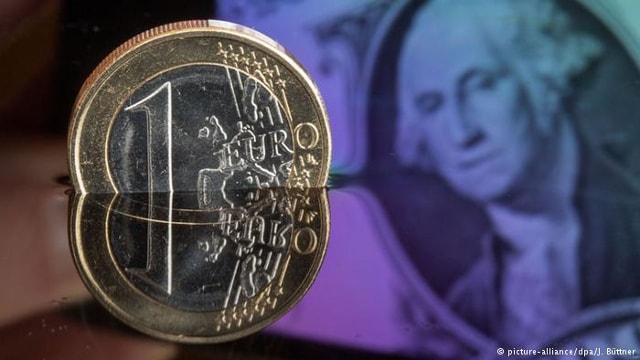Old wine in new bottle
(Baonghean) - Recently, a senior advisor to the new US President Donald Trump declared that the common currency of Europe - the euro - will only play the role of Germany's own currency, allowing this economic locomotive to "fully exploit" its partners in the European Union and the United States. However, after all, for Berlin, this is just a story of "old wine in a new bottle"...
 |
| Ms. Merkel has spoken out against accusations from the US. Photo: Internet. |
Accusations and counter-accusations
In an interview with the British business daily Financial Times, Peter Navarro, a senior advisor to the new White House owner Donald Trump, “accused” Germany of profiting from a “grossly undervalued” euro, causing harm to its European partners and the US. According to Navarro, Germany is taking advantage of and exploiting these countries through a “disguised Deutsche Mark”.
These accusations are not new, they are simply repeated in a different tone. The reason they are not new is because they have been raised many times before by American economists, officials such as the head of the International Monetary Fund Christine Lagarde, and even Trump's predecessor, former President Barack Obama.
Of course, the German media and politicians are not willing to sit still and take the blame. Some reputable German TV channels and press agencies emphasize that no matter how many times the accusations are repeated, it is impossible to “shut up the child’s mouth” or “turn black into white.”
Earlier this week, German “Iron Lady” Angela Merkel firmly rejected Navarro’s claims, stating that Germany was not responsible for the euro’s devaluation against the US dollar. She said: “When it comes to the euro and its valuation, Germany is the country that has always urged the European Central Bank to have an independent policy, as the Bundesbank did before the euro was created.”
It can be seen that, with this statement, Mrs. Merkel is resolute and wise, strongly "counterattacking" those who accuse her government as well as the European economic locomotive, indirectly drawing a clear line and affirming that Germany has no influence on the choices or decisions of the European Central Bank. The German general cannot and does not want to change anything in a direction that is unfavorable to the EU.
“Side effects”
According to a commentary in Deutsche Welle, it is undeniable that the European Central Bank's actions have contributed significantly to the decline in the euro's exchange rate. This financial institution is applying a zero interest rate policy and has faced a wave of harsh criticism from German savers.
The European Central Bank is also pumping huge amounts of money into the system, trying to buy time for countries like France and Italy, which are reeling from the wave of reforms to their troubled economies. And the massive money printing is undoubtedly putting heavy pressure on the value of the common currency.
In fact, this has the “side effect” of making German goods relatively cheaper and gaining a competitive advantage in the global market. However, this was never the intention of the European Central Bank, but simply an unintended consequence of its “ultra-low” interest rate policy.
Furthermore, German exporters have never relied on exchange rate factors to sell their products on the world market. It is clear that they have still sold very well even in periods when the euro has strengthened significantly against the US dollar.
The secret behind the success of German exporters lies not only in the price of their products, but above all in the quality of their goods. It is obvious that the demand for German car and machine manufacturers to produce lower quality products is only to “adjust” the world trade balance and “appease” selfish minds with a different understanding of economics and trade relations.
 |
| Trump's adviser believes Germany benefits from undervaluing the euro. Photo: dpa. |
Sharing responsibility
Meanwhile, the US has also contributed to the strengthening of the dollar and the weakening of the euro. The US Federal Reserve's move to raise interest rates has pushed the dollar up, and the US central bank is expected to continue raising interest rates at least three more times this year. Analyst Rolf Wenkel said that this will widen the currency gap between the two strong currencies and could push the euro lower against the dollar.
If this scenario pans out, it wouldn’t be the first time the euro has fallen below the dollar. There was a time when 1 euro was worth just 95 cents, when Greece announced it met the criteria to join the eurozone and became a member on January 1, 2001.
In retrospect, it was a decision that did not bring any benefits to this Southern European country. Moreover, the time when European countries, especially Germany, gained an unfair competitive advantage by adopting the euro was not met with any criticism.
The question now, therefore, is whether this exchange rate dynamic will continue and, if so, for how long. On the other hand, the focus should be on the medium- and long-term impacts from possible scenarios.
Unfortunately, the European Central Bank's interest rate outlook and its cash flows into markets are likely to continue on their current course, at least until the end of the year.
And that means a growing divergence in monetary policy between the Eurozone and the US. However, it must be admitted that the German government or central bank are not involved in the planning of the monetary easing policy of Europe's leading financial institution.
As for the US, there is no doubt that Mr. Trump is not “pleased” with the large trade deficit of the number 1 economy. However, that deficit is not only due to the exchange rate, but also has its roots in the nature of consumer protection in American society. And in fact, the US public debt has increased by about 10 trillion in just the past 8 years.
Trump also sees competition in the global marketplace as nothing more than a zero-sum game, where one loses and the other wins.
And on the bright side, Germany being targeted by the US President and his associates can be a compliment to this European country. The federal government in Berlin can simply ignore the tone coming from Washington, and treat the accusations from across the Atlantic as normal!
Thu Giang
| RELATED NEWS |
|---|

.jpg)




.jpg)

